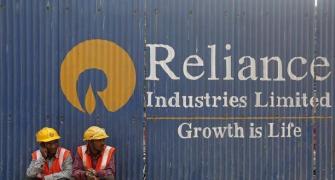One of the holy grails of investing is to game the lead-lag relationship between financial markets and the real economy. The financial economy always leads, but the time-differential varies. The stock market can bottom many months before the real economy.
Judging by what happened in the stock market during September-October 2008 and what is happening now in the real economy, the lead-lag in the current cycle may be around six months. The market hit four-year lows in October 2008 when the Nifty slid to 2,250.
The Index of Industrial Production (IIP) contracted by a record amount in February according to the numbers that have just been released. The Wholesale Price Index is almost static it gained 0.26 per cent year-on-year in the week ended March 28.
Anecdotal evidence suggests that the economy will do a little better in the first quarter (April-June) of 2009-10 than in the fourth quarter (January-March 2009) of 2008-09. If that is the case and the improvement is sustainable, the real economy has bottomed out, roughly five-six months after the market hit its last major low.
It's difficult to believe that the economy is past its nadir. But it's possible and one could point to current market behaviour to support this thesis. The market has gained over 30 per cent in the past month on sustained foreign institutional buying.
There are two possible explanations for that surge. One is that the smart money knows what it is doing and we'll see confirmations of a turnaround when the real economy picks up in the second half of 2009-10. That is, assuming the lead-lag differential remains about the same.
The other explanation is more complicated. In the past month, the FIIs have put back around Rs 2,000 crore into Indian equity after pulling out around Rs 7,000 crore in January-February. This influx of Rs 2000 crore could be hawala money round-tripping back to be deployed in the forthcoming elections.
If this is indeed so, the stock market rise is very temporary and there will be a wave of profit-booking as the cash flows back out to fund campaigns. Of course, regardless of the source of the funds, the real economy could still have bottomed out.
If this rally is indeed fuelled by long-term fund flows, the FIIs are displaying a great deal of collective courage. India's deficits (trade, fiscal) are looking dangerous, exports have crashed, the currency is down, forex reserves are under pressure, domestic demand is weak, the political situation is unclear.
Valuations are at levels difficult to justify on conservative metrics. To justify PEs of 15-16 (based on the four quarters of calendar 2008), the Nifty must generate 15-20 per cent earnings growth in 2009-10. Most analysts would consider that optimistic. Historical experience also suggests Indian markets are valued at lower than PE 16, more than 50 per cent of the time.
If the wrong government or no government at all comes to power, there will be a policy vacuum. That will impact the one area of investment that India Inc is still banking on. Infrastructure project finance has been impacted by the global recession. But it has been far less affected than private corporate investment because government funds are committed to various projects. A policy vacuum would knock even that activity on the head.
Assuming that every advisory hasn't got it wrong, 2009-10 will not be a great year. The real economy is likely to perform only marginally better than it did in the second half of 2008-09 when growth slowed dramatically. That means big earnings improvements are unlikely. The recovery may be slow and that could mean a year when stock prices don't do anything dramatic either.
I would personally bet on a crash during the next two months. FIIs are not noted for their collective bravery and it's far more likely that the current rally is driven by hot short-term flows than by long-term commitments made in the teeth of their own negative advisories.
Even if a crash doesn't happen, valuations seem high. The market may not drop too heavily. But then, it's liable to meander near the current levels for the next 10-12 months.
A strategy that buys heavily on declines will gain. So will systematic EMI-style investment. But don't get carried away and bet your shirt on further short-term gains.








